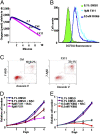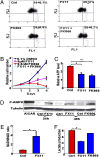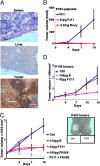Inhibition of lactate dehydrogenase A induces oxidative stress and inhibits tumor progression
- PMID: 20133848
- PMCID: PMC2836706
- DOI: 10.1073/pnas.0914433107
Inhibition of lactate dehydrogenase A induces oxidative stress and inhibits tumor progression
Abstract
As the result of genetic alterations and tumor hypoxia, many cancer cells avidly take up glucose and generate lactate through lactate dehydrogenase A (LDHA), which is encoded by a target gene of c-Myc and hypoxia-inducible factor (HIF-1). Previous studies with reduction of LDHA expression indicate that LDHA is involved in tumor initiation, but its role in tumor maintenance and progression has not been established. Furthermore, how reduction of LDHA expression by interference or antisense RNA inhibits tumorigenesis is not well understood. Here, we report that reduction of LDHA by siRNA or its inhibition by a small-molecule inhibitor (FX11 [3-dihydroxy-6-methyl-7-(phenylmethyl)-4-propylnaphthalene-1-carboxylic acid]) reduced ATP levels and induced significant oxidative stress and cell death that could be partially reversed by the antioxidant N-acetylcysteine. Furthermore, we document that FX11 inhibited the progression of sizable human lymphoma and pancreatic cancer xenografts. When used in combination with the NAD(+) synthesis inhibitor FK866, FX11 induced lymphoma regression. Hence, inhibition of LDHA with FX11 is an achievable and tolerable treatment for LDHA-dependent tumors. Our studies document a therapeutical approach to the Warburg effect and demonstrate that oxidative stress and metabolic phenotyping of cancers are critical aspects of cancer biology to consider for the therapeutical targeting of cancer energy metabolism.
Conflict of interest statement
The authors declare no conflict of interest. C.V.D. is member of the Scientific Advisory Board of Agios Pharmaceuticals; there is no sponsored research or technology licensing activities involving the company. An invention relating to this work was reported to the Johns Hopkins Technology Transfer office.
Figures




References
-
- Warburg O. On the origin of cancer cells. Science. 1956;123:309–314. - PubMed
-
- Gatenby RA, Gillies RJ. Why do cancers have high aerobic glycolysis? Nat Rev Cancer. 2004;4:891–899. - PubMed
-
- Hsu PP, Sabatini DM. Cancer cell metabolism: Warburg and beyond. Cell. 2008;134:703–707. - PubMed
-
- Kroemer G, Pouyssegur J. Tumor cell metabolism: Cancer’s Achilles’ heel. Cancer Cell. 2008;13:472–482. - PubMed
Publication types
MeSH terms
Substances
Grants and funding
LinkOut - more resources
Full Text Sources
Other Literature Sources
Research Materials
Miscellaneous

